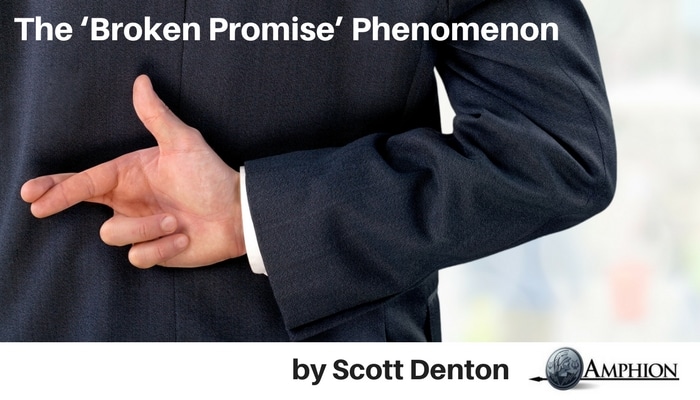
The ‘Broken Promise’ Phenomenon
Disappointment
Everyone can relate to how it feels when an anticipated outcome fails to come to fruition. People in our lives tend to let us down occasionally, such as an employee who fails to provide the statistics needed for a boardroom presentation by the deadline, despite committing to do so. And don’t forget about the longtime friend who always promises to help out with undesirable tasks such as moving some heavy furniture, but fails to follow through. These days, it seems commonplace to expect a certain outcome only to find ourselves wallowing in a sea of chronic disappointment. Because these examples are seemingly endless, it begs a question: Why do people make promises they don’t keep?
The Selfish Motive
How many times have we encountered that certain someone who’s eager to commit to doing something, only to find our thoughts to be immediately consumed by that little voice inside our head mumbling, “Yeah, sure you will.” As it turns out, experts have actually determined why promises are made and why they are broken. To understand why a person makes the commitment in the first place, one must first understand how making promises makes a promise-maker feel. That’s right. Experts have discovered that many of the people who are promising to help you through your ordeal are not actually doing it for you. They are doing it for themselves.
Self-Completion Theory
So prevalent is the selfish desire behind promise-making that there is actually a name for it: the Self-Completion Theory. This theory, which has been credited to psychology researchers Robert A. Wicklund and Peter M. Gollwitzer at the University of Austin, states that when a person chooses an identity by which they want to be known, such as a company executive, a lawyer, or even a top “go-to” employee, they engage in behaviors that help substantiate that very identity. Moreover, when any of these behaviors receive any sort of positive feedback, they feel they have succeeded in establishing that same desired identity. This is known as, “self-completeness.” But here’s the rub. The researchers found that it’s actually the positive feedback itself that satisfies the promise-makers desire to feel “self-complete.” Therefore, following through on their promises immediately becomes less important.
For example, if an employee strives to be identified and recognized as their supervisor’s most dependable and valued employee, they will display behaviors that coincide with that identity, like committing to take on more tasks to free up the supervisor’s busy schedule, for instance. The supervisor would likely commend the employee by not only thanking him or her, but may actually make a positive statement such as, “It’s nice to have someone like you that I can count on.” A statement like this would make the employee feel “self-complete”, and that is where the problem begins. The research indicates that it is unlikely this employee will successfully meet the obligations to which he or she just committed. This is because the desire for “self-completeness” is so dire that people will often make promises without really thinking through their ability to follow-through with them.
Self-Completion Theory in Business
Unfortunately, some businesses operate this same way. They engage in behaviors that ultimately disappoint their customers. How many loss prevention professionals have been promised exceptional service levels, only to be inundated by store managers calling to report some system, tool or equipment still hasn’t been repaired despite the many service calls previously placed? Perhaps those solutions providers who engage in the activity of disappointing customers had already received their “self-completeness” the day the service contract was signed. Unfortunately for them, their “self-completeness” will be short-lived, especially when their damaged reputation begins to precede them.
The good news is that the Self-Completion Theory is not a mandate on how things have to be. People have a choice as to whether or not they will do what they say they will do. At Amphion, we take this to heart. Customer service is our passion, and our customers frequently attest to this. In a recent interview, Larry Carrol, Vice President of Asset Protection for 99 Cents Only Stores, stated:
“Amphion’s responsiveness and resolving issues right away is what makes my customer experience awesome. This level of responsiveness is so important in loss prevention and to 99 Cents Only Stores, because everything that we do is with a sense of purpose and urgency. It’s what we’ve created culturally at 99, and it’s what Amphion supports.”
It is statements like this, rather than broken promises, that make the Amphion team “self-complete.”
About Amphion
Amphion is a security integrator delivering unmatched service to national restaurant and retail customers across the country. Specializing in loss prevention and security products and services, they are the one-stop-shop to safeguard your business assets.
Amphion manufactures and supplies the highest quality security products available on the market today! Access Control Systems (SFIC keying systems, InstaKey, Biometrics and Aiphone), SOLINK ANALYTICS, CCTV, NVR’s, DVR’s, Custom Safes (Amsec, Fire King, Tidel, Gunnebo Cash Recycler Systems), Safe Locks (ESL, Securam, LPlocks), Counterfeit Detectors, Exit Control door hardware (Detex, Alarm Lock, Code Locks), and much more.
With its nationally renowned technical support task force, Amphion provides certified technicians on-site within four hours, 7-days a week, 365 days a year. With a California-based, live 24-hour, technical support team and a comprehensive service management model, no one stands behind their products and services like Amphion.
To contact Amphion, call (800) 520-2677, or visit Amphion.biz.
Sources:
http://changingminds.org/explanations/theories/self-completion.htm
http://brainstormpsychology.blogspot.co.uk/2013/07/self-completion-theory.html
